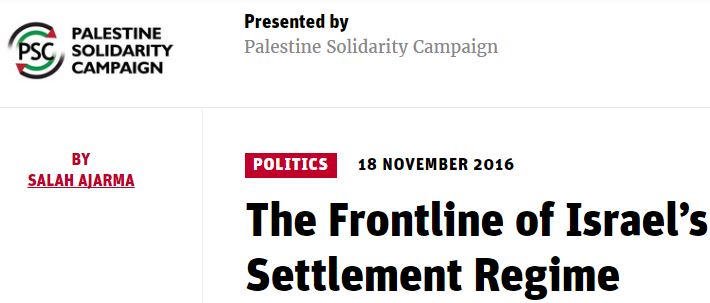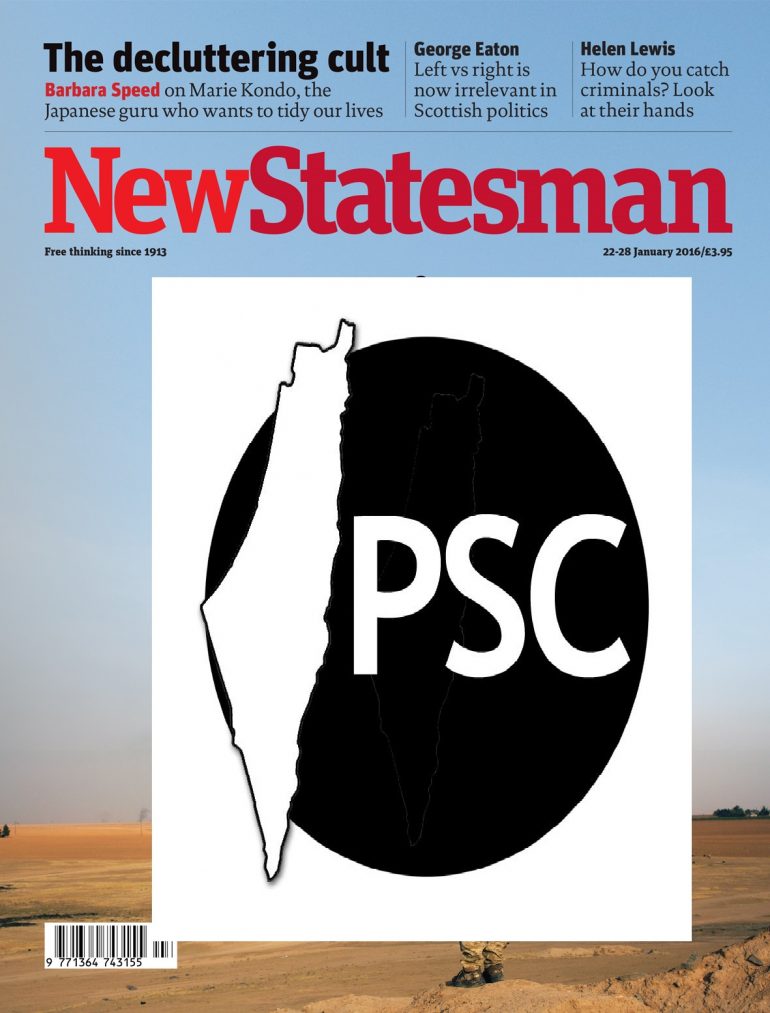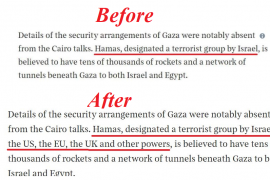(See important update at the bottom of this post.)
Palestine Solidarity Campaign (a group so radical and reportedly compromised by links to extremism that a British bank closed its account due to fears its cash could be funneled to illegal groups in Gaza) is collaborating with the ‘New Statesman’ (a magazine which once published one of the more antisemitic covers in recent UK media history) to produce a series of articles on PSC’s campaign against “Israel’s illegal settlements”.

The results are quite predictable.
The most recent New Statesman / PSC entry (The Frontline of Israel’s Settlement Regime, Nov. 18th) was written by Salah Arjama, the director of Lajee Cultural Centre in Aida Refugee camp, and the propaganda begins in the first paragraph:
Aida refugee camp, in which I live and work, is on the edge of the famous town of Bethlehem. Our families established the camp in 1950 after being forcibly expelled from their homes by Zionist militias in 1948. Palestinians from our camp originate from villages in the Jerusalem and Hebron districts, just a few miles down the road. Those born since, still live in the refugee camp, and continue to struggle for the right to return to our homes.
Of course, by “Zionist militias”, Arjama is referring to the IDF – the national military of Israel which (upon the state’s declaration of independence) incorporated several pre-state Jewish paramilitary organizations, and subsequently defended the nascent state from six invading Arab armies.
Regarding the “refugees”: As we’ve demonstrated previously, there are very few actual refugees alive. Arjama’s suggestion that millions of Palestinians – descendents of refugees – have a right to return to “homes” where they never lived, within Israeli cities they never once stepped foot in, has no precedent in history or international law.
After explaining why he founded Lajee Cultural Centre, Arjama continues:
In 2002, Israel’s government began the construction of its illegal wall. Its consequences are now perhaps well-known – land confiscation, ghettoization, and an accelerated ethnic cleansing of Palestinians. In Aida the wall has been particularly obtrusive with its towering concrete blocks built directly opposite the Centre. The young people I work with have only ever known a life surrounded by this wall and under the constant surveillance of its ominous watchtowers. Before its construction, families and children would spend time in nature, in the olive groves that neighboured the camp. As one of the few green spaces available to us, I would often go there for picnics with my family when the weather was warm. This has now been shut off from us, creating a menacing, stifling atmosphere that we cannot escape
First, the decision (by the ICC) about the legality of Israel’s security fence – that Arjama falsely suggests completely “surrounds” the camp – was only an advisory opinion – and a highly disputed one at that.
Regarding Arjama’s claim of “ethnic cleansing”: The broad charge that Jews are ethnically cleansing Arabs (Palestinians or otherwise) in the Middle East, based on the numbers, represents the opposite of the truth. In the territory where Jews rule or have ruled in some manner since 1948, the Arab population has increased dramatically, while territories in the region where Arabs rule (representing over 99% of the total land) have slowly become almost completely Judenrein. Those suggesting that Israel is conducting “a war of extermination against the Palestinians” are engaging in an almost comical historical inversion.
Additionally, Arjama conveniently omits some facts about the “green space” allegedly taken away from them. As even UNRWA acknowledges, residents subsequently “organized a recreational space on the border of the camp, including a playground, garden and a soccer field.”
Arjama continues:
On the hill opposite, Israel’s illegal settlement of Gilo continues expanding onto land confiscated by the wall.
Gilo is, in fact, a neighborhood in southern Jerusalem situated roughly one kilometer beyond the 1949 armistice lines, largely built on land purchased by Jews before World War 2. After 1967, additional land was sold to Israelis by the former mayor of Beit Jallah – the same land later used for building projects in Gilo. Additionally, as CAMERA demonstrated, Palestinians do not claim Gilo should be part of their future state, and have implicitly conceded that it will remain part of Israel in any future peace deal.
Arjama continues:
In October 2015, Aida Camp buried one of its sons, Abd al-Rahman Ubeidallah, who was shot in the chest by an Israeli sniper. He was 13 years old and killed on his way home from school.
Despite the suggestion that an Israeli soldier intentionally killed a child, multiple reports suggest that the boy was shot accidentally during the IDF’s response to a riot in which Molotov cocktails and explosive devices were thrown at soldiers. The soldier who fired was reportedly aiming for an adult who was standing next to the 13-year-old.
Whilst it’s indeed tragic that the boy was killed, the failure of Arjama to provide any context represents yet another example of the propaganda masquerading as facts throughout the op-ed. Indeed, later in the same paragraph, Arjama claims that the camp is “routinely broken into by Israeli soldiers and border police” without explaining that such operations are anti-terror raids. Indeed, one 19-year-old “son” of Aida was responsible for the Jerusalem bus bombing earlier in the year which injured 20. And, just last month, Ynet reported that “seven underage Palestinians from…Aida…[were] arrested on suspicion of preparing and throwing explosive devices at those who came to pray at Rachel’s Tomb”.
Arjama then turns his attention to the ‘sins’ of the UK government:
“As Palestinians, we know all too well the dishonourable history of Britain in our region, a legacy that has yet to be resolved. The UK Government, like many others, continues to support the discredited ‘peace process’ whilst taking very little meaningful action. The UK regards settlements as illegal and a barrier to peace, whilst nevertheless continuing to trade with them. The contraction between their stated aims, on the one hand, and the ongoing financial relationship between UK-based companies and charities, on the other, has led to the longstanding perception amongst Palestinians that the UK Government is not serious about its desire for peace.”
Once again, Arjama is engaged in a significant obfuscation.
Whilst, as he wrote, the UK does object to Israeli settlement construction, they also have consistently characterized Palestinian incitement and terror as major impediments to peace. In fact, just last month the UK froze $30 million in aid (nearly one-third of the UK’s total aid to the PA) “over concerns the aid was being used to fund salaries for Palestinian terrorists”, fund public celebrations of terror attacks and other forms of terror glorification which are inimical to peace.
Arjama’s myopic take on the Israeli-Palestinian Conflict – which paints Israel as the villain and fails to even minimally acknowledge Palestinians’ responsibility in perpetuating the violence – is characteristic of such professional propagandists.
Though PSC (whose Patrons include Jenny Tonge and Caryl Churchill) has every right to spread this kind of misinformation, the New Statesman – which fancies itself a serious news magazine guided by “scepticism” and “free thinking” – owes its readers more than to amplify and legitimise such one-sided, intellectually unserious hyperbole.
…
UPDATE on Nov. 29th: New Statesman removed the article entirely from their website. It’s been replaced with the following statement:
In November, the New Statesman removed from its website a paid-for post funded by the Palestine Solidarity Campaign (PSC).
This was not related to the contents of the post – which can be read here, along with an earlier post – but was part of a larger conversation within the organisation about guidelines around advertorial and the presentation of advertiser-written content. We removed the post without explanation to the PSC, which was discourteous.
The New Statesman prides itself on independent journalism from around the world, and will continue to cover the Israel/Palestine conflict in line with its editorial values. We are committed to providing our readers with a range of perspectives on this and other issues and reaffirm our commitment to broad, sceptical public debate on the conflict.





